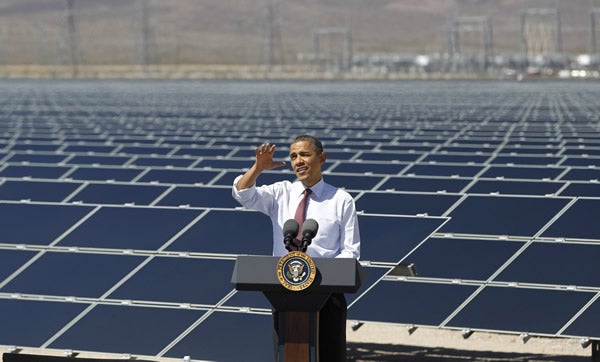Taxpayer-Backed Green Energy Firms Struggle, But Hike Executive Pay
Lachlan Markay /
When insurance giant AIG paid lucrative bonuses to top executives after receiving federal support, President Obama asked, “How do they justify this outrage to the taxpayers who are keeping the company afloat?”
But three years later, numerous green energy companies backed financially by the administration are paying out large salaries and bonuses to their executives, even as the companies struggle to stay financially solvent.
Scribe recently reported that Ecotality, a stimulus-backed electric vehicle charging station manufacturer that has received about $141 million in Energy Department grants, increased “executive and director” compensation by 150% in 2011.
Meanwhile, the company is struggling financially. “We have a history of losses which may continue and may negatively impact our ability to achieve our business objectives,” Ecotality notes in its latest filing with the Securities and Exchange Commission.
The company posted net losses of $22.5 million last year, and “a large percentage of our revenues depends on the progress of our activities under grants from the DOE,” the SEC filing notes, meaning taxpayers are contributing mightily to the company’s continued survival, even while it increases executive compensation.
First Solar, which received nearly $1.5 billion stimulus-backed DOE loan guarantees, recently announced it would lay off 2,000 workers. But during First Solar’s quick financial decline, the company paid its CEO $32 million in salary and bonuses over three years. He was fired after presiding over a nearly 30% decline in the value of the company’s stock.
The stock price for electric vehicle battery manufacturer A123 Systems is languishing at a meager $0.86, down from a high of $25.77 in 2009. But the company, which received nearly $250 million in stimulus funds, continues to hike the pay of its top executives.
Like Ecotality, A123 is dependent upon federal support. “The failure to obtain [additional federal] funds or other incentives,” the company notes in a recent SEC filing, “could materially and adversely affect our ability to expand our manufacturing capacity and meet planned production levels.”
In 2011, four of A123’s top employees received an average 20% increase in their base salaries. Three of those executives saw further increases in their 2012 salaries, to an average of more than $375,000 apiece. It also awarded 1,210,000 shares of company stock to five of its top executives.
In addition to Ecotality, A123, and First Solar, notorious solar panel manufacturer Solyndra gave its executives pay raises and bonuses after the company went bankrupt, despite having received a $535 million federal loan guarantee through the stimulus package.
(h/t Paul Chesser)

